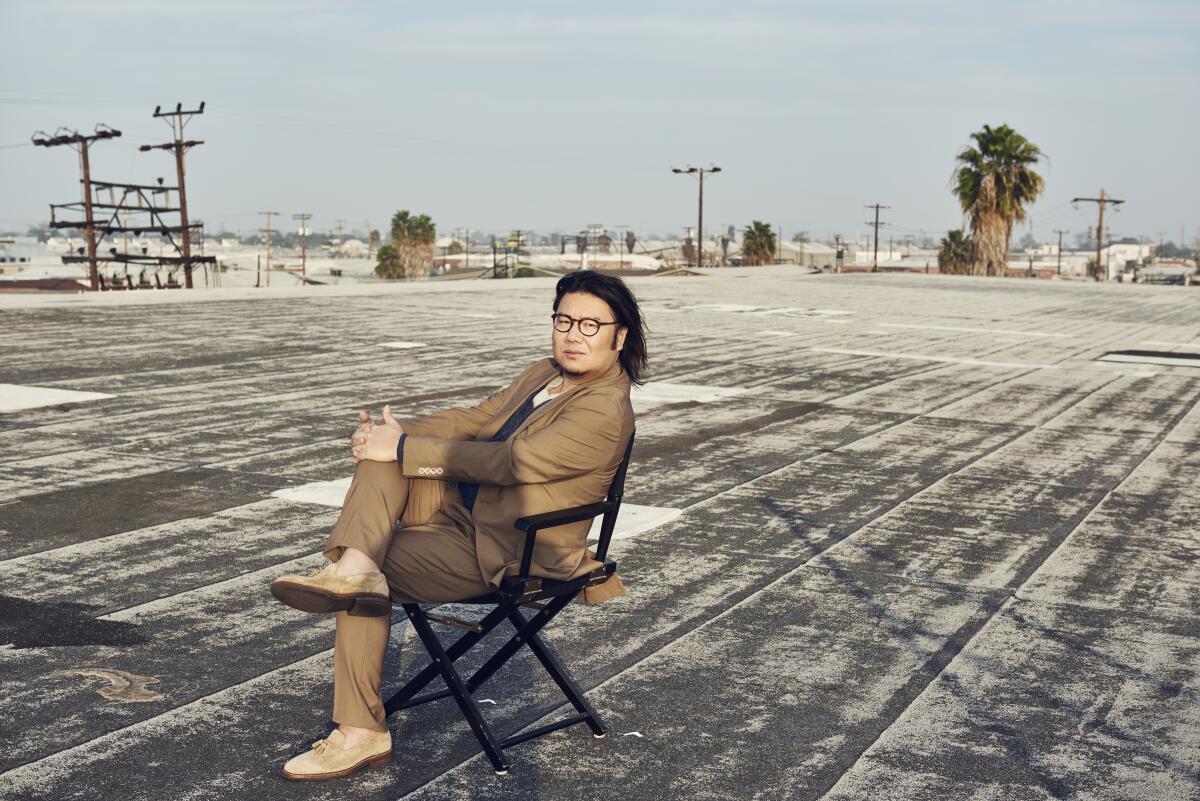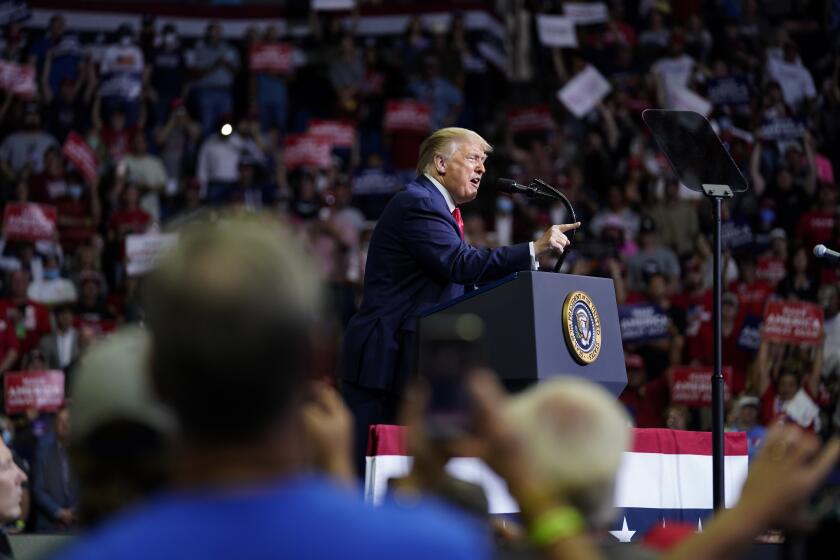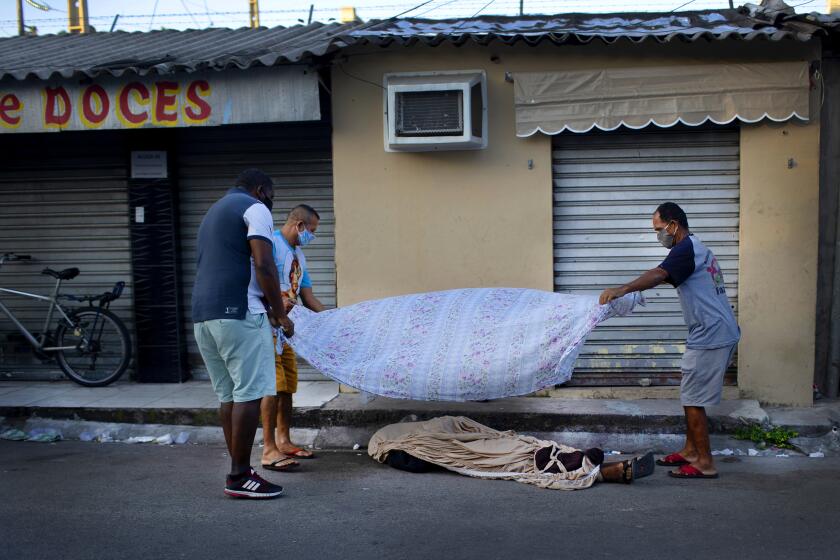“Crazy Rich Asians” author Kevin Kwan tackles crazy rich Americans

- Share via
Kevin Kwan has had a singular influence on Asian American storytelling and Hollywood’s pop cultural landscape. His bestselling “Crazy Rich Asians” trilogy, chronicling absurdly wealthy Asian families in Singapore, set off a surge of demand for oft-ignored Asian voices in both literature and cinema.
When Hollywood approached him to turn the first book into a movie in 2016, Kwan famously turned down an offer from Netflix with which he “could have moved to an island and never worked another day.” Instead, he gambled on a theatrical release with Warner Bros., marking the first time a major studio produced a movie with an all-Asian cast since Amy Tan’s “The Joy Luck Club” in 1993. It went on to become the highest-grossing romantic comedy in a decade, cementing Kwan’s status as a cultural pioneer and proving to Hollywood, a culture still happily whitewashing casts, that there was a thirst for actual Asian characters.
In the aftermath, Kwan signed deals to write two TV shows and became an L.A. native — a shift that worked its way into his new novel, “Sex and Vanity,” out this week. The satirical romance overlaps with his trilogy, referencing familiar characters, but touches down in new landscapes — Capri’s luscious coastline and New York’s cosmopolitan beehive — and follows the journey of Lucie, a half-Asian, half-Anglo heiress. He spoke via phone from his home, for an interview edited for length and clarity, about the allure of the filthy rich during a recession, the surge in anti-Asian racism and Hollywood’s arrival at “base camp” on the journey toward full inclusion.
There’s a palpable affection in your new novel for Hollywood and Los Angeles culture in general.
As a writer you’re always affected by where you are, and this book was written primarily in L.A. I moved here two years ago. Places sort of seep their way into the story — even though this is supposed to be the New York story.
In this book there’s more of a hyphenated Asian-American story, through the hapa [half-Asian] character. Was that a purposeful change of protagonist?
Absolutely. I gave it my all with “Crazy Rich Asians” and focused on Asia with unapologetically [Asian characters]. So I wanted to tell a story that was especially hapa-influenced. That was very important for me. I was trying to give voice to a specific type of person’s experience. Lucie has got the existential struggles that all biracial people have, which were inspired by stories I’ve heard from people close to me — stories like fixing their hair or objectifying them into an Asian object to show off. I really just went for it and tried to approach it sensitively from both sides, because you know there is also a world of completely unintentional racism.
The comment is a reminder of the xenophobia that has often been the bedfellow of racism in America.
Her struggle with her Asian identity resonated with me, partly because of the recent anti-Asian backlash in response to the coronavirus. Did that concern you at all?
I wrote this book before the pandemic and like all my books, I’m trying to create more understanding between people, between cultures. So of course, there’s been this terrible anti-Asian wave, and I feel in a strange way it could not be more timely to have a book like this.
I grew up in suburban Texas, so I’m very familiar with racism toward Asians. And everything is so much more amplified because of social media — and because of the bully pulpit that Trump has — so of course it’s going to influence people and embolden them. I’m sure you’ve had many people tell you stories of being attacked or verbally attacked by … racists. What else is there to call them?
Yep.
It’s really hard because it hits close to home. I’ve had family members who’ve been affected and been abused. It’s still very concerning and very disappointing.
As for the white characters, I read that you drew inspiration from your time in the New York media world.
It wasn’t even in New York media — more like the 22 years I spent having a lot of friends who came from this WASPy, privileged world. I’d go to the Hamptons and be invited to all these exclusive private clubs. I was convinced I was the first nonwhite person ever to walk through the doors of a certain gate. The looks of horror when you walk into a dining room — you can see that. It’s so obvious. I think a different person would have a completely different reaction, and for me, because I’m pretty sure in who I am and very proud of my Asian roots, it doesn’t make me feel inferior. It’s just an interesting cultural experience. I file it away and end up using it in a satirical novel 20 years later.
What inspired the emphasis on educational pedigrees in this book?
That was a little satirical, because until I moved to New York I’d never met people who were that education obsessed.
Even among Asians?
Well, Asians are like, “Where’s your kid going to college? Yale, Stanford, Harvard or MIT?” Within the East Coast elite it’s not even about college, it’s like, “Where did you go to preschool”? And then kindergarten, prep school, high school, and then college and then your graduate degree. It stratifies you in this complex universe. But it also reminded me very much of Singapore, where I spent the early part of my childhood. It’s tribal.
We’re in a different socioeconomic climate, and in a presidential race where popular sentiment is not with the wealthy. How can we relate to stories of excess in the middle of a disastrous recession?
People have always been fascinated by the rich and powerful. This goes back to prehistoric times, to people reading the Bible or the Quran. Those are all collections of stories of the rich and powerful in their day. And at the height of the Spanish flu, people were still reading Edith Wharton and Henry James, who also wrote about rich people. I think people who are not part of that 1% almost find solace in reading about the foibles of the privileged, because they see that they’re all too human. People can connect to that — or it’s pure escapism.
The United Nations predicts that a global recession will reverse a three-decade trend in rising living standards and thrust half a billion people into extreme poverty.
Is there any talk of turning “Sex and Vanity” into a movie, if you can discuss it?
[Laughs] I’m very hopeful, why don’t we say that.
What are your thoughts on the renewed excitement around Asian American stories in Hollywood? Has it been enough?
I definitely don’t think it’s been enough. And I’m not just talking about my movies, because three movies in one century is way not enough, quite frankly. Two TV shows is not enough in a huge landscape. I think there are beginning to be changes. There’s definitely more than there’s ever been, [but] I think we’re still at base camp.
Do you think you’ll always be writing about Asian characters?
I feel committed to always doing projects that showcase diversity in a variety of ways. I don’t want to ever be a one-trick pony, where every project has to have an Asian focus. But I’m still very much trying to help the cause. I don’t know where that will take me. Right now these are the stories that interest me, and I always feel this commitment to creating stories that can be planted into Hollywood productions that give a lot of amazing, talented people the work they deserve.
Kim is the social impact correspondent at MTV News.
More to Read
Sign up for our Book Club newsletter
Get the latest news, events and more from the Los Angeles Times Book Club, and help us get L.A. reading and talking.
You may occasionally receive promotional content from the Los Angeles Times.










